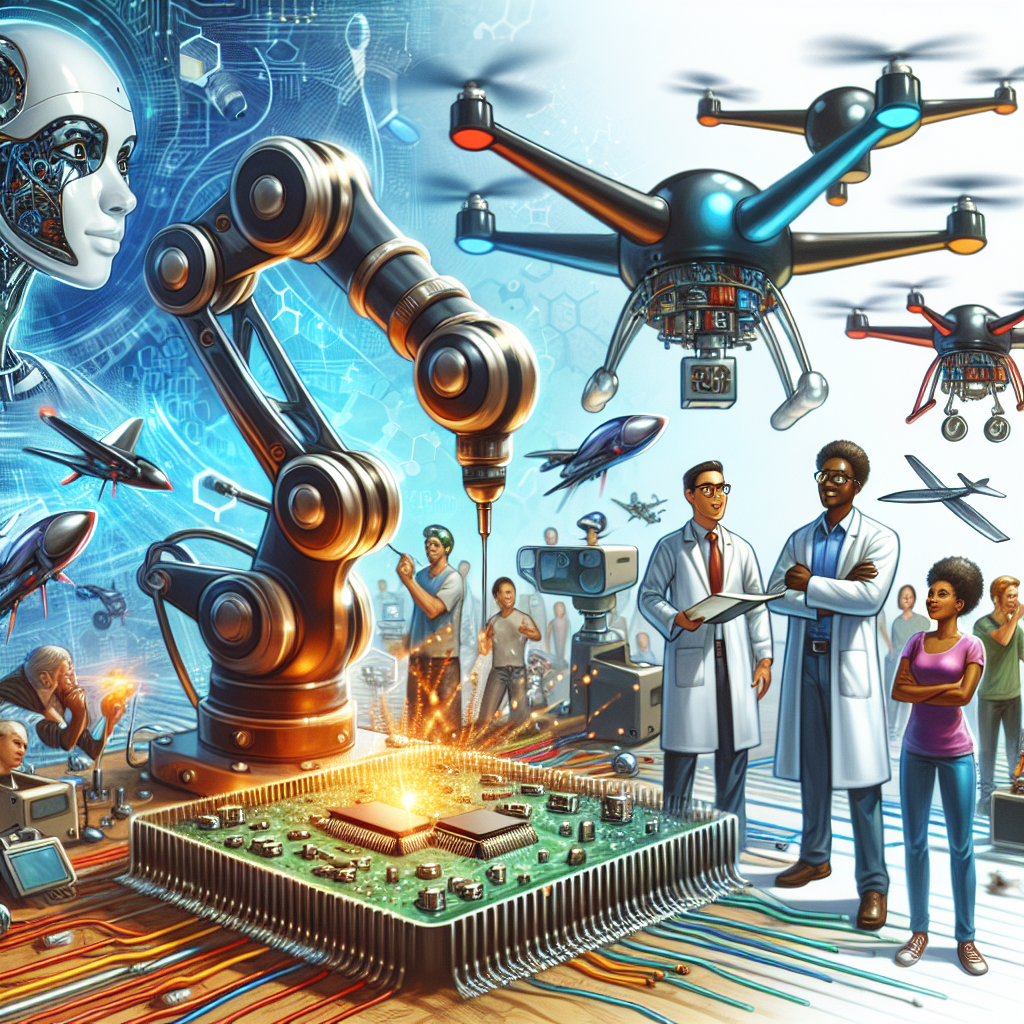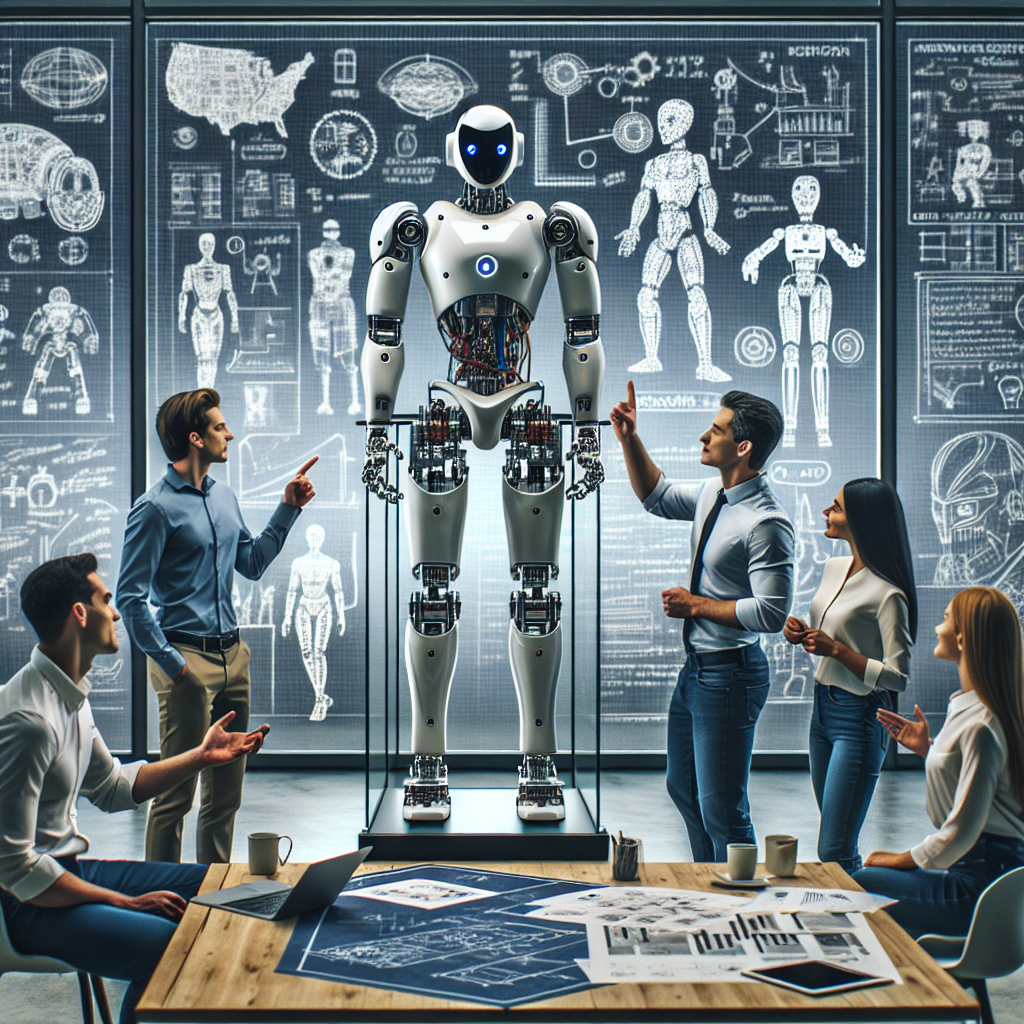In today’s rapidly evolving technological landscape, robotics startups are at the forefront of innovation and are poised to revolutionize industries across the board. These cutting-edge companies are pushing the boundaries of what is possible with artificial intelligence, machine learning, and automation. From manufacturing to healthcare to agriculture, the potential applications of robotics are limitless. In this bustling ecosystem, there are a handful of startups that stand out for their groundbreaking advancements and disruptive technologies. Keep an eye on these emerging stars in the world of robotics as they continue to push the envelope and shape the future of automation.
Exploring the World of Robotics Startups
Understanding the Robotics Industry Landscape
The robotics industry is currently experiencing a significant transformation, driven by technological advancements and evolving consumer demands. Several key factors shape the landscape of robotics startups and influence their growth and success:
-
Increased Automation: With the rise of Industry 4.0, there is a growing need for automation across various sectors, including manufacturing, healthcare, agriculture, and logistics. Robotics startups are leveraging advanced robotics technologies to develop solutions that streamline processes and increase efficiency.
-
Emerging Technologies: Innovations in artificial intelligence, machine learning, computer vision, and sensors are revolutionizing the capabilities of robots. Startups that integrate these cutting-edge technologies into their robotic systems are gaining a competitive edge in the market.
-
Collaborative Robotics: The demand for collaborative robots, or cobots, is on the rise as companies seek flexible and safe robotic solutions that can work alongside human workers. Robotics startups focusing on human-robot collaboration are driving the adoption of cobots in diverse industries.
-
Diverse Applications: Robotics startups are exploring a wide range of applications, from autonomous drones for aerial inspections to robotic exoskeletons for medical rehabilitation. This diversity in use cases demonstrates the versatility and adaptability of robotics technology.
-
Global Market Expansion: The robotics industry is witnessing rapid global expansion, with startups targeting international markets to scale their operations and reach a broader customer base. Cross-border collaborations and partnerships are becoming common among robotics startups to drive innovation and market penetration.
Factors to Consider When Identifying Promising Robotics Startups
When delving into the realm of robotics startups, it becomes crucial to assess various factors that can indicate the potential success of a company in this innovative field. By carefully considering specific criteria, investors and enthusiasts can pinpoint the most promising ventures to watch out for. Below are key aspects to keep in mind when evaluating robotics startups:
-
Innovative Technological Solutions: One of the primary factors to consider is the level of innovation the startup brings to the table. This involves assessing the uniqueness of the technology they are developing and how it differentiates them from competitors.
-
Market Demand and Fit: Understanding the market demand for the robotics solution offered by the startup is essential. A successful robotics company should address a clear need or problem in the market and have a strategy to effectively meet that demand.
-
Team Expertise and Experience: The expertise and experience of the founding team play a significant role in the success of a robotics startup. Evaluating the qualifications, background, and track record of the team members can provide insights into their ability to navigate the challenges of the industry.
-
Funding and Growth Potential: Assessing the funding status and growth potential of a robotics startup is crucial. Companies with solid financial backing and a clear roadmap for scaling their operations are more likely to succeed in the long run.
-
Partnerships and Collaborations: Collaboration with industry partners, research institutions, or other companies can enhance the credibility and capabilities of a robotics startup. Partnerships can provide access to resources, expertise, and market opportunities that can accelerate growth.
-
Regulatory Compliance: Compliance with regulatory requirements is vital in the robotics industry, especially in fields like healthcare or autonomous vehicles. Startups that demonstrate a clear understanding of regulatory challenges and have plans to address them are better positioned for success.
By carefully analyzing these factors, investors and industry observers can identify promising robotics startups with the potential to make a significant impact in the ever-evolving world of robotics technology.
Top Robotics Startups Making Waves

Company A: Revolutionizing Autonomous Vehicles
- Breakdown of the technology and innovation behind Company A
Company A is at the forefront of revolutionizing autonomous vehicles through its cutting-edge technology. Their approach combines state-of-the-art sensors, artificial intelligence algorithms, and advanced robotics to create a seamless driving experience. The company’s technology allows vehicles to perceive their surroundings, make real-time decisions, and navigate complex environments with precision. By leveraging machine learning and deep neural networks, Company A has developed a sophisticated system that continuously learns and adapts to different driving conditions.
- Impact of Company A’s products on the autonomous vehicle market
The products developed by Company A have already started to make a significant impact on the autonomous vehicle market. Their innovative solutions have the potential to improve road safety, reduce traffic congestion, and enhance transportation efficiency. By offering a reliable and scalable autonomous driving platform, Company A is poised to shape the future of mobility. Their technology is not only transforming the way we think about transportation but also opening up new possibilities for industries such as delivery services, ride-sharing, and logistics. With their commitment to innovation and excellence, Company A is definitely a robotics startup to watch in the autonomous vehicle sector.
Company B: Pioneering Robotics in Healthcare
- Overview of the unique solutions offered by Company B in the healthcare sector
Company B has emerged as a trailblazer in the realm of robotics applied to healthcare. Through their innovative robotics solutions, they have revolutionized patient care and medical procedures. One of their standout offerings is a robotic surgical system that enhances the precision and efficiency of surgical operations. This system integrates cutting-edge technology to assist surgeons in performing complex procedures with unparalleled accuracy. Additionally, Company B has developed robotic exoskeletons that aid in rehabilitation processes, enabling patients to regain mobility and strength with personalized support.
- Potential future developments and partnerships for Company B
Looking ahead, Company B shows promising potential for further advancements and collaborations in the healthcare sector. They are actively exploring partnerships with leading medical institutions to expand the adoption of their robotics solutions. Moreover, Company B is investing in research and development to enhance the capabilities of their robotic systems, with a focus on improving patient outcomes and advancing the field of robotic-assisted healthcare. By forging strategic alliances and driving innovation, Company B is poised to shape the future of healthcare robotics and make a lasting impact on the industry.
Company C: Advancing AI in Robotics Applications
Top Robotics Startups Making Waves
In the realm of robotics startups, Company C has emerged as a prominent player due to its groundbreaking work in advancing AI integration within robotics applications. Here’s a closer look at the key aspects of Company C’s contributions and the potential implications of its advancements on various industries:
-
Deep Learning Algorithms: Company C has developed sophisticated deep learning algorithms that empower robots to learn and adapt to dynamic environments in real-time. By leveraging AI technology, these robots can enhance their decision-making processes and perform complex tasks with a high level of efficiency.
-
Autonomous Navigation Systems: One of Company C’s notable achievements is the creation of autonomous navigation systems that enable robots to navigate crowded spaces autonomously. This breakthrough has significant implications for industries such as logistics and warehousing, where robots need to navigate complex environments with precision and safety.
-
Human-Robot Collaboration: Company C’s focus on human-robot collaboration has resulted in the development of robots that can work alongside humans seamlessly. Through advanced AI capabilities, these robots can understand and respond to human gestures and commands, making them valuable assets in settings where close interaction with humans is required.
-
Industry Disruption: The integration of AI in robotics applications by Company C has the potential to disrupt various industries, including manufacturing, healthcare, and agriculture. By introducing robots equipped with advanced AI capabilities, Company C is paving the way for increased automation, efficiency, and productivity in these sectors.
-
Future Prospects: As Company C continues to push the boundaries of AI in robotics, the future looks promising for the integration of intelligent robots in diverse fields. With a focus on innovation and technological advancement, Company C is poised to make a lasting impact on the robotics landscape and shape the future of automation.

Emerging Players in the Robotics Startup Scene
Startup D: Redefining Warehouse Automation
Disruptive technologies employed by Startup D in warehouse automation
– Startup D has revolutionized warehouse automation by implementing cutting-edge AI algorithms that optimize inventory management and streamline order fulfillment processes.
– The use of advanced robotics systems equipped with computer vision technology allows Startup D to automate repetitive tasks with precision and efficiency.
– Incorporating machine learning algorithms enables Startup D to continuously improve its operations by analyzing data and adapting to changing demands in real-time.
Market potential and growth prospects for Startup D
– With the rise of e-commerce and the increasing need for efficient logistics solutions, Startup D is well-positioned to capitalize on the growing demand for automated warehouse solutions.
– The scalability of Startup D’s technology and its ability to integrate seamlessly with existing warehouse infrastructures make it an attractive option for businesses looking to enhance their operations.
– As Startup D continues to innovate and expand its offerings, it is poised for significant growth in the rapidly evolving warehouse automation market.
Startup E: Innovating in Robotic Process Automation
Startup E has been making significant strides in the realm of robotic process automation, leveraging cutting-edge technology to revolutionize how businesses approach their operations. Here are some key details highlighting their innovative approach:
-
Utilizing Advanced Robotics Technology: Startup E harnesses state-of-the-art robotics technology to streamline and optimize business processes. By incorporating robotics into various workflows, they enable increased efficiency and accuracy in operations.
-
Customized Solutions for Diverse Industries: One of Startup E’s standout features is its ability to tailor robotic process automation solutions to meet the specific needs of different industries. Whether it’s manufacturing, healthcare, or finance, Startup E offers bespoke robotic solutions that drive tangible results.
-
Enhancing Productivity and Cost-effectiveness: Through their robotic process automation implementations, Startup E has consistently demonstrated a marked improvement in productivity levels for their clients. By automating repetitive tasks and reducing errors, businesses can achieve higher levels of efficiency while cutting down on operational costs.
-
Real-world Impact: Startup E’s success stories speak volumes about the tangible impact of their solutions. Case studies reveal how businesses have experienced significant time savings, reduced manual errors, and increased overall productivity after integrating Startup E’s robotic process automation technology into their workflows.
In conclusion, Startup E stands out as a leading player in the robotics startup scene, offering innovative solutions that drive operational excellence and business growth across various industries.
Startup F: Revolutionizing Consumer Robotics
Startup F has positioned itself as a prominent player in the consumer robotics market, offering innovative products that cater to the needs and preferences of modern consumers. Their robotic products are designed to revolutionize the way individuals interact with technology in their daily lives, providing practical solutions to common challenges.
Overview of Startup F’s consumer-centric robotic products:
– Startup F’s flagship product is a household robot that assists with various tasks such as cleaning, organizing, and entertainment.
– The robot is equipped with advanced AI capabilities, allowing it to learn and adapt to the user’s preferences over time.
– Startup F’s consumer robotics lineup also includes educational robots for children, designed to stimulate learning and creativity through interactive experiences.
Expansion strategies and market penetration for Startup F:
– Startup F has adopted a multi-faceted approach to expand its market reach, including partnerships with retail chains and e-commerce platforms.
– The company is focused on enhancing brand visibility through targeted marketing campaigns and participation in industry events and trade shows.

– Startup F is also exploring opportunities to collaborate with other tech companies to integrate their robotics technology into existing smart home ecosystems, further solidifying their presence in the consumer robotics sector.
The Future of Robotics Startups
Trends Shaping the Future of Robotics Entrepreneurship
Robotics entrepreneurship is rapidly evolving, driven by several key trends that are shaping the future landscape of the industry. These trends provide valuable insights for aspiring robotics entrepreneurs looking to capitalize on emerging opportunities and navigate potential challenges in this dynamic sector.
1. Advancements in Artificial Intelligence (AI) Integration
– Robotics startups are increasingly integrating advanced AI technologies into their robotic systems, enabling enhanced autonomy, adaptability, and decision-making capabilities.
– The seamless integration of AI algorithms allows robots to learn from and adapt to their environments, paving the way for more sophisticated and intelligent robotic solutions across various industries.
2. Focus on Human-Robot Collaboration
– A notable trend in robotics entrepreneurship is the emphasis on developing robots that can work collaboratively with humans in shared workspaces.
– Startups are leveraging technologies such as safe sensing, intuitive interfaces, and collaborative robotics to create robots that can assist and augment human workers, rather than replace them entirely.
3. Expansion of Robotics as a Service (RaaS) Model
– The RaaS model is gaining traction among robotics startups, offering robots and automation solutions as a service rather than a product.
– This trend allows businesses to access robotics technology without significant upfront costs, fostering greater adoption of robotics solutions in various industries and applications.
4. Sustainable and Ethical Robotics
– With a growing focus on sustainability and ethical considerations, robotics startups are investing in developing eco-friendly and socially responsible robotic solutions.
– Startups are exploring ways to reduce the environmental impact of robots, promote ethical practices in robotics development, and ensure that robotic technologies benefit society as a whole.
5. Cross-Disciplinary Collaboration
– Collaboration between robotics startups and experts from diverse fields such as engineering, design, psychology, and healthcare is becoming increasingly common.
– By leveraging insights and expertise from different disciplines, robotics startups can create innovative and user-centric robotic solutions that address real-world challenges effectively.
Investing in the Next Generation of Robotics Innovators
Investing in robotics startups is crucial for driving innovation and pushing the boundaries of technology. As the demand for automation and intelligent systems continues to rise across various industries, supporting the next generation of robotics innovators can lead to groundbreaking advancements. Here are some key points to consider when investing in robotics startups:
-
Identifying Promising Ventures: Conduct thorough research to identify robotics startups with disruptive technologies and strong leadership teams. Look for companies that address significant challenges or provide unique solutions in sectors like healthcare, manufacturing, agriculture, or logistics.
-
Understanding Market Trends: Stay informed about the latest trends and developments in the robotics industry. Assess how startups align with current market demands and future growth opportunities. Consider factors such as scalability, market potential, and competitive advantage.
-
Building Strategic Partnerships: Collaboration with established companies, research institutions, or industry experts can enhance the growth and success of robotics startups. Strategic partnerships can provide access to resources, expertise, and networks that accelerate innovation and market penetration.
-
Supporting Entrepreneurial Ecosystems: Invest not only financially but also by offering mentorship, guidance, and access to industry networks. Supporting entrepreneurial ecosystems through incubators, accelerators, or innovation hubs can help robotics startups overcome challenges, refine their business models, and scale their operations effectively.
-
Measuring Impact and Sustainability: Evaluate the social and environmental impact of robotics startups alongside financial returns. Consider how technologies contribute to sustainability, efficiency, and societal well-being. Investing in startups with a long-term vision and commitment to responsible innovation can yield lasting benefits.
Investing in the next generation of robotics innovators requires strategic thinking, due diligence, and a forward-looking approach to capitalize on the transformative potential of emerging technologies. By supporting startups at the forefront of robotics innovation, investors can drive progress, shape industries, and create value in the rapidly evolving landscape of automation and artificial intelligence.
FAQs: Robotics Startups to Watch
What are some emerging robotics startups in the industry to keep an eye on?
There are several exciting robotics startups making waves in the industry. Some to watch include Boston Dynamics, known for their advanced humanoid robots and dynamic robotics solutions; Fetch Robotics, a company focusing on autonomous mobile robots for warehouse automation; and Brain Corp, a leader in AI and robotics technology for autonomous cleaning robots.
How can I stay updated on the latest developments and news from these robotics startups?
To stay informed on the latest news and developments from robotics startups to watch, you can follow their social media channels, sign up for their newsletters, attend industry conferences and events where they may be presenting, and read industry publications that cover advancements in robotics technology.
What sets these robotics startups apart from others in the industry?
These robotics startups stand out for their innovative technology, unique solutions to common challenges in robotics, and their potential to disrupt the industry with their advancements. They are often recognized for their cutting-edge research, partnerships with industry leaders, and successful pilot programs that demonstrate the efficacy of their robotic solutions.
